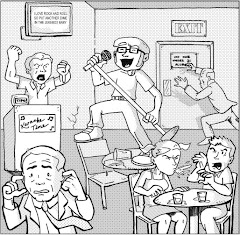
Irredeemable/Incorruptible: Free Comic Book Day Edition, Boom! Studios
by Mark Waid, Peter Krause, Jean Diaz, Belardino Brabo, Andrew Dalhouse, Ed Dukshire
Imagine, superheroes are real. You know, Superman, Batman, Iron Man, and the rest. People flying, fighting crime, trying to make the world a better place. Pretty awesome, right? Now, imagine that Superman goes totally nuts. Who could stop him? Welcome to Mark Waid's Irredeemable. Many writers have tried to explore dynamic themes within the superhero genre by creating archetypal parallels to Superman, Batman, Captain America, etc., from Kurt Busiek's Astro City to The End League, just to name a few, and the corrupted ubermench isn't new, either, from Miracle Man to Supreme . . . So what makes Waid's story so different? Well, he isn't pulling any punches, that's for sure, as we watch his proverbial Superman lobotomize his teammates or murder their families. Further, we can only presume his sudden villainy the result of mankind's relentless selfishness, but his motives really aren't clear. Fortunately, if this series' title is any clue, we'll have plenty of time to figure them out. The dilemma is, if the world's greatest hero suddenly became its most dangerous threat, would you hope for his defeat or redemption?
Interestingly, Waid pursues that inquiry in Incorruptible, a sister title that has the world's most notorious bad guy suddenly reformed and determined to stop his nemesis from killing the rest of the superheroes and destroying the world. Ironically, on the surface, these two men are still just fighting each other, something they were doing before the paradigm shift, but now with totally different goals in mind. What would it take to redeem an established super-villain? Exactly how many times would he have to save the world? The overarching theme is really one of power -- namely, if you have it, what do you do with it? And how long before it changes you? Are standing irredeemable or incorruptible your only ultimate options?
G.I. Joe: A Real American Hero #155 1/2, IDW Publishing
by Larry Hama, Agustin Padilla, J. Brown, Robbie Robbins
by Mark Waid, Peter Krause, Jean Diaz, Belardino Brabo, Andrew Dalhouse, Ed Dukshire
Imagine, superheroes are real. You know, Superman, Batman, Iron Man, and the rest. People flying, fighting crime, trying to make the world a better place. Pretty awesome, right? Now, imagine that Superman goes totally nuts. Who could stop him? Welcome to Mark Waid's Irredeemable. Many writers have tried to explore dynamic themes within the superhero genre by creating archetypal parallels to Superman, Batman, Captain America, etc., from Kurt Busiek's Astro City to The End League, just to name a few, and the corrupted ubermench isn't new, either, from Miracle Man to Supreme . . . So what makes Waid's story so different? Well, he isn't pulling any punches, that's for sure, as we watch his proverbial Superman lobotomize his teammates or murder their families. Further, we can only presume his sudden villainy the result of mankind's relentless selfishness, but his motives really aren't clear. Fortunately, if this series' title is any clue, we'll have plenty of time to figure them out. The dilemma is, if the world's greatest hero suddenly became its most dangerous threat, would you hope for his defeat or redemption?
Interestingly, Waid pursues that inquiry in Incorruptible, a sister title that has the world's most notorious bad guy suddenly reformed and determined to stop his nemesis from killing the rest of the superheroes and destroying the world. Ironically, on the surface, these two men are still just fighting each other, something they were doing before the paradigm shift, but now with totally different goals in mind. What would it take to redeem an established super-villain? Exactly how many times would he have to save the world? The overarching theme is really one of power -- namely, if you have it, what do you do with it? And how long before it changes you? Are standing irredeemable or incorruptible your only ultimate options?
G.I. Joe: A Real American Hero #155 1/2, IDW Publishing
by Larry Hama, Agustin Padilla, J. Brown, Robbie Robbins
In G.I. Joe: A Real American Hero #155 1/2, writer Larry Hama picks up where he left off with Marvel Comics G.I. Joe #155 lo those many years ago, via the creative freedom and adoration of IDW Publishing. I wasn't a big G.I. Joe fan as a kid, so many of this issue's nuances are lost to me, but I appreciate Hama retaining the timelessness of this potentially dated franchise. Since the Cobra of the '80s, America has seen terrorism at its worst, and the potential to take a military-themed franchise down that road exists -- thankfully, not here. Sure, this issue begins with Cobra storming the Senate chambers, but it's an assault as fantastical as Skeletor charging Castle Greyskull. Ultimately, it doesn't matter, because it's all make believe. Hama also maintains a dark sense of humor throughout, playing to the child in any G.I. Joe fan. I'm not chomping at the bit Hama's return to the franchise, but it's nice to know Joe's in good hands, and Free Comic Book Day was a good time to celebrate it. After all, just knowing is half the -- okay, okay. I won't go there.
Ultimately, these two issues have something in common : a spotlight on the bad guy. Well, much to my delight, reading about the bad guy can be a good thing . . . and they'd appreciate that, at free, these comics were a steal.



